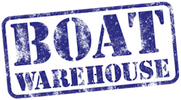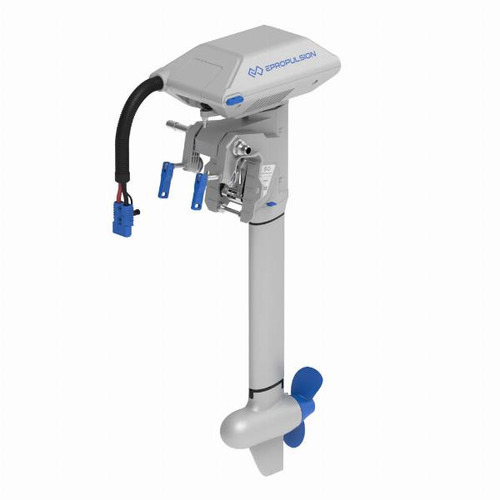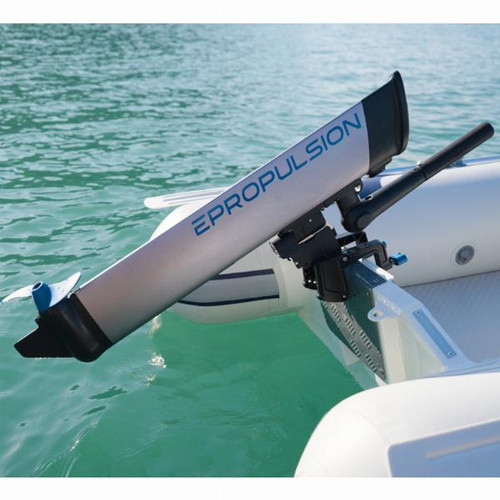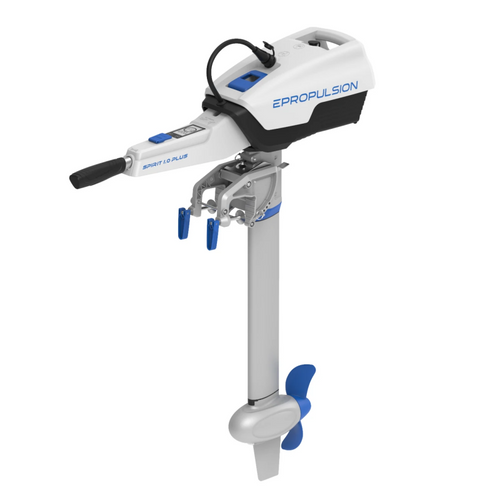ePropulsion Navy 3.0 EVO Electric Motor
The NAVY 3.0 is a 3kW (~6HP) electric outboard motor designed for performance and quietness. The brushless DC motor inside the NAVY 3.0 is placed at the bottom and surrounded by water allowing direct and effective cooling. A gearbox-free design eliminates noise and maintenance requirements commonly seen with petrol outboard motors.
The built-in motor protection slows or stops the motor when it collides with objects underneath the water. More time can now be spent enjoying the trip instead of spending hours or days with the mechanic! All of these features unite to create an electric outboard motor that is perfect for cruising, fishing and other water activities.
Navy series electric outboard motors deliver simple and efficient power at 6 HP (this product) or 9.9 HP (see here) depending on the model. Sleek, easy-to-use and eco-friendly, these outboards will be a staple of your boating experience for years to come.
Includes:
- Navy 3.0 Outboard Motor Body
- Power and communication cables
- 3 Year Warranty
Note:
- Tiller or Remote Controller must be purchased separately.
- If not opting for the Tiller Controller, you will need to purchase a steering wheel, helm and steering cables separately in order to steer the motor.
| Step One - Choose Your Motor | Step Two - Choose Your Control | Step Three - Choose Your Battery |
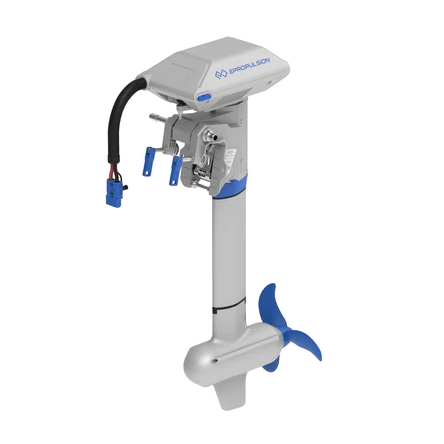 |
 |
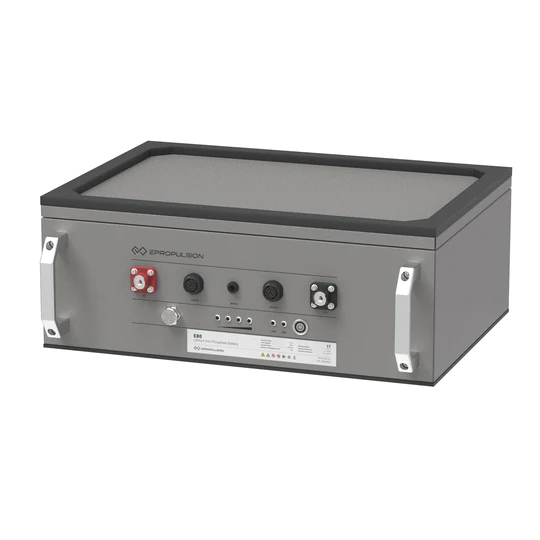 |
| Navy 3.0 Evo (~6 HP) - this product Navy 6.0 Evo (~10 HP) |
ePropulsion Evo Top Mount Controller ePropulsion Evo Side Mount Controller ePropulsion Dual Controller for dual motor installations ePropulsion Evo Tiller Controller |
ePropulsion E40 Lithium Battery (~2000 Wh) ePropulsion E80 Lithium Battery (~4000 Wh) ePropulsion E175 Lithium Battery (~9000 Wh) |
| Part Number | Shaft Length* | Suits Transom Height |
|---|---|---|
| EPP-NE-3000-S0 | Short Shaft | Less than 50cm |
| EPP-NE-3000-L0 | Long Shaft | Greater than 50cm |
* See FAQs below for more details on choosing the correct shaft length.
VIDEOS
SPECIFICATIONS
| Power | 3kW (6HP equivalent) |
|---|---|
| Operation Voltage | 48V (input range 39V to 60V) |
| Recommended Battery | ePropulsion E-Series Battery |
| Motor Weight* | 24.3kg |
| Shaft Length | Short: 63.4cm, Long 75.9cm |
| Static Thrust | 590N / 132.6 pounds |
| Propeller Speed | 2300 RPM |
| Propeller | 10.2" 2-blade composite (6.7" pitch) |
| Trim / Tilt Angle | 0°, 5°, 10°, 15° / 60° |
| Hydrogeneration | Yes |
| Motor Type | Brushless DC Motor |
| Direct Drive | Yes |
| Maintenance Free | Yes |
* Outboard weight is for the short shaft model and excludes the weight of the controller.
** Hydrogeneration data is based on real tests with the anticavitation plate installed.
PERFORMANCE & RANGE - ePropulsion Navy 3.0 Evo
The below performance data is based on a 12-foot aluminium boat with one person, powered by one Navy 3.0 Evo and E80 battery in calm lake water. The actual speed, range and running time may vary because of different boats, load, weather, etc.
| Power | Speed | Runtime | Range |
|---|---|---|---|
| 300 Watts | 6.0 kph | 13h 20m | 79.3km |
| 550 Watts | 7.5 kph | 7h 25m | 56.3km |
| 1000 Watts | 8.6 kph | 4h 00m | 34.1km |
| 1500 Watts | 9.7 kph | 2h 40m | 25.7km |
| 2000 Watts | 10.2 kph | 2h 00m | 20.4km |
| 2500 Watts | 12.8 kph | 1h 35m | 20.5km |
| 3000 Watts | 16.4 kph | 1h 20m | 21.9km |
FAQS
How to Choose the Right Shaft Length?
If you are looking for an ePropulsion electric outboard for your boat, choosing the correct shaft length is important. If you go too long it would still work but it may lack performance. You will also risk hitting bottom or submerged objects more frequently such as rocks. If you go too short, that’s the worst scenario as you‘re more than likely going to cavitate.
Please note that ePropulsion has a different shaft length measurement from petrol-powered outboards. For electric outboards the shaft length is measured from the top of the clamp bracket to the center of the propeller. For petrol outboards it's measured from the top of the clamp bracket to the anti-ventilation plate.
ePropulsion's "S" is close to "L" from Mercury. ePropulsion's "L" is longer than "L" from Mercury.
To find the suitable shaft length, the principle is to make sure the top of the propeller is matched to the lowest point of the transom. Hard to put it into practice? Well, in order to get the right shaft length, first, measure the transom height, the length from the top of the boat transom to the bottom of the boat.
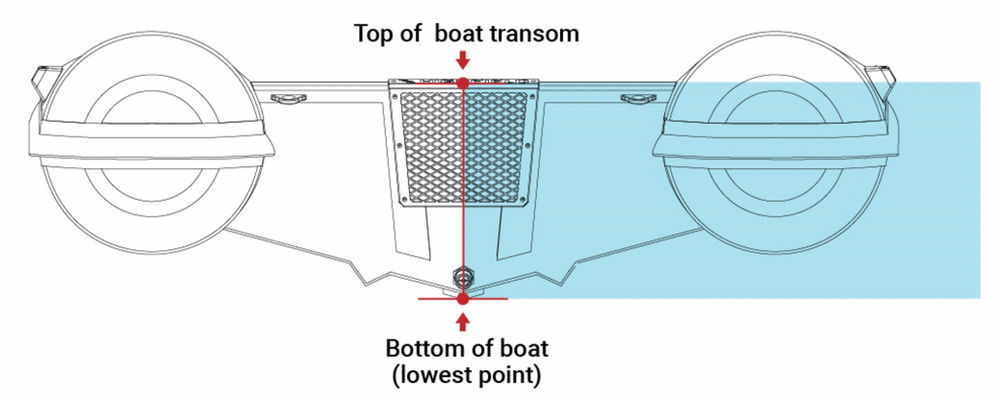
Can I use E40 to power Navy 3.0 Evo or E80 to power Navy 6.0 Evo?
Yes, but parallel connection is required. To power one Navy 3.0 Evo with E40, you need two E40 batteries in parallel. To power one Navy 6.0 Evo with E80, you need two E80 batteries in parallel.
ePropulsion recommends the E80 battery for Navy 3.0 Evo, and E175 battery for Navy 6.0 Evo. For more info, please check ePropulsion Tutorial: ePropulsion E-Series Battery | General Instructions
Can I use third-party batteries to power Navy 3.0 / 6.0 Evo?
First, ePropulsion's original E-Series battery has the best unit price on the market, as low as $0.46 per WattHour. Second, the E-Series battery weighs 70% less than the lead-acid battery with equivalent usable capacity, and costs 50% in five-year use.
Third, because of incompatible communication protocol, when powered by third-party batteries, the ePropulsion motor cannot access real-time battery status and apply the best operation strategy.
Despite all these, if you still prefer third party lithium or lead-acid batteries. The nominal battery voltage should be 48V. The continuous discharge current should be over 62.5A for Navy 3.0 Evo and 125A for Navy 6.0 Evo.
Do I need to charge the Evo top mount control?
The Evo top mount control has a built-in battery and it can be self-powered by its solar panel. When you use it with wireless connection and the control is at low battery level, you could charge the Evo top mount control with a communication cable.
Will Navy 3.0 / 6.0 Evo work for saltwater use?
Yes, it is designed for extensive use in the saltwater. We choose high-quality aluminum alloy as the base material, and apply anodizing coating and powder coating on top of it. For more info, please check ePropulsion Blog: How does ePropulsion make an outboard motor corrosion-resistant?
